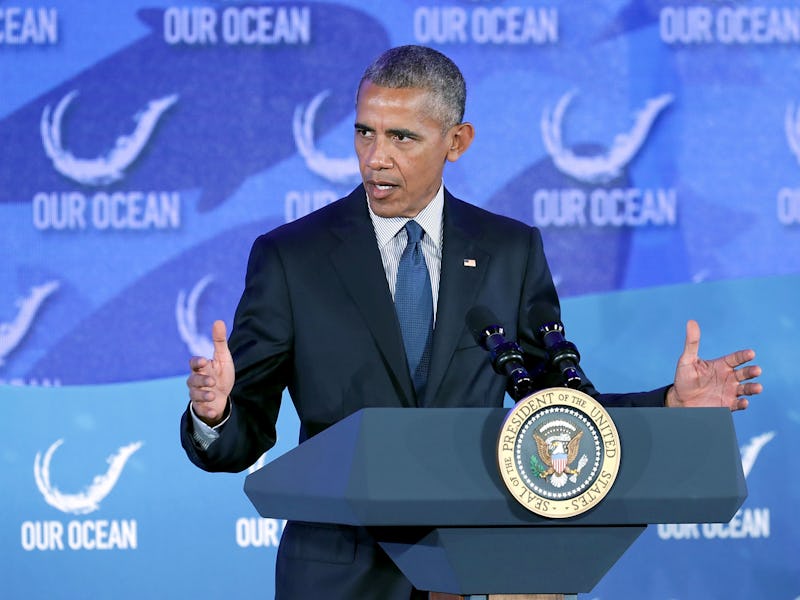What in the World Is a Marine National Monument?
Commercial fisheries are pretty pissed off about President Obama's announcement.

President Barack Obama announced Thursday the creation of the first national marine monument — the Northeast Canyons and Seamounts Marine National Monument — in the Atlantic Ocean, off the coast of Cape Cod.
“Today’s designation will protect 4,913 square miles of marine ecosystems with unique geological features that have been the subject of scientific exploration and discovery since the 1970s,” according to a news release. He expanded:
“These features include three underwater canyons deeper than the Grand Canyon, and four underwater mountains known as ‘seamounts’ that are biodiversity hotspots and home to many rare and endangered species. Scientific expeditions to this region have yielded new discoveries including species of coral found nowhere else on Earth and other rare fish and invertebrates. Additionally, the canyons and seamounts provide habitat for protected species such as sea turtles and marine mammals, including endangered sperm, fin, and sei whales and Kemp’s ridley turtles.”
Lobster and red crab fishermen aren’t exactly pleased about this effort, which they argue destroys a large swath of valuable oceanfront business; they’ve been given seven years to phase out operations in the area.
“We don’t normally create laws in this country by the stroke of an imperial pen,” Bob Vanasse, a spokesperson for the National Coalition for Fishing Communities, tells NPR. “This is not only an end-run around Congress, it’s an end-run around the entire system the Congress created to protect these ocean resources.”
So what’s a marine national monument? It’s a first, to be sure, borrowing from its land-based cousin, the national monument, which is a protected area much like a national park. The key difference: A national monument is created through an executive order, not an act of Congress — hence, the accusation of Obama being imperialist.
Seals clap for Obama's Atlantic Marine National Monument designation, which should ensure rich feeding grounds into the future.
The president is using power bestowed by the 1906 Antiquities Act, which allows for the designation of “historic landmarks, historic and prehistoric structures, and other objects of historic or scientific interest” as monuments to be protected, “the limits of which in all cases shall be confined to the smallest area compatible with the proper care and management of the objects to be protected.”
What’s abundantly clear is that Obama is pushing the limits of his executive power in the final weeks of his presidency in order to leave a legacy — and he hopes that his legacy will foremost be one of climate change action and environmental conservation.
“The notion that the ocean I grew up with is not something I can pass on to my kids and my grandkids is unacceptable,” he said in the announcement. “It’s unimaginable. And so the investment that all of us together make here today is vital for our economy, it’s vital for our foreign policy, it’s vital for our security, but it’s also vital for our spirit. It’s vital to who we are.”
If you’re thinking that he’s co-opted irrelevant legislation to serve a radical environmentalist agenda, you wouldn’t be the first. But Obama’s decision comes with a strong precedent. In 1920, a mining claimant took the federal government to court, claiming that the entire Grand Canyon could not be considered a monument. The Supreme Court disagreed, and since then many presidents have used the law as a means to wilderness preservation. Obama’s just the first to extend the definition of the wilderness to waters.
It’s easy to forget, in today’s bizarro political landscape, that environmental conservation is fundamentally originally a conservative concern: America’s first Marine National Monument, located off the coast of Hawaii, was designated as such by none other that George W. Bush.
These wilderness spaces matter. It’s not about saving plants and animals, it’s about saving humans. It’s about the fact that today’s rate of species extinction is as high as it was when nearly all the dinosaurs died out, leading many scientists to posit that we’ve entered Earth’s sixth mass extinction event. It’s about the fact that, in the oceans, larger creatures are dying out faster, and their disappearance is disproportionately bad for ecosystems.
And if you’re only concerned about a species once it’s on the brink of extinction, it’s already too late. Protecting an animal while pillaging its habitat is a hopeless cause. Protecting large swaths of wilderness, on land and at sea, is a big step in the right direction. It’s not about protecting the ocean from humans, it’s about protecting it for humans. Fishing until there just aren’t any fish left isn’t an option.